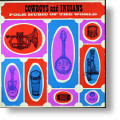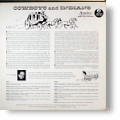LPs
Cowboys and Indians
America Record Society, AR 1043

1965
Notes and Track Description (From the back of the LP sleeve)
The present record marks what we hope will be an interesting departure from its predecessors in "Music for Everyman." Up to now we have been stressing "art music" (for want of a better word); we are planning now a brief series on "folk music." This is in part a response to requests from our subscribers, and in part an unreluctant admission that most of the world's music is, to an extent at least, "folk."
What seemed only a fad, just a few years ago, has now turned into a tide. What there is about "folk music" that so appeals to Americans today is not easy to isolate: in a way, we may be dealing with a normal reaction against the mountains of "slick" music that tend to block all other views of music. This is not to question the technical competence of producers of cocktail music and other popular music that exploits orchestral methods created by Tchaikovsky, Wagner and later serious composers. Yet, both "folk" and jazz and other predominantly spontaneous forms of musical creativity seem, even to the uninitiated, to offer a tone of authenticity not found in "concert popular" or typical Hollywood, lush music performed by giant orchestras.

Another element in the present enthusiasm for "folk" seems to lie deeper: in a return to roots, to essentials, perhaps to something archetypal, in our culture. This is not to say that most folk music heard today is really ancient; much of it is created by the performers themselves -- as is the case in this recording. Further, a great deal of what is called "folk" is as repetitious and cliché-riden in phony as the music against which it reacts. Good composers are probably as rare in "folk" as in "classical." The problem, however, is not one of the age of the individual composition, but rather of the source of the style. And even more important, the problem of the quality of music created and performed within a given style.
Another myth about folk music that has been exploded by scholars has to do with the way of creating it. In his excellent Introduction to Folk Music in the United States, Bruno Nettl shows that "cultivated music" and "folk music" are composed in the same way. There is no difference at all. A symphony or a melody is normally composed by one person -- not by some great "collective unconscious" or mythical abstraction. The difference comes after the music is composed: in the performance, the re-creation, what has been called "communal re-creation." Especially when we are dealing with an oral tradition (with little or no writing), a song will undergo slight changes almost every time it is sung -- at least every time it is sung by different performers. Little by little it becomes something else: it may, for example, come to sound Russian, even if the original singer was a German, or American, or Latin American, or Negro. One reason why it is often difficult to identify the source of a Negro spiritual is because it is gradually transformed with personal accentuations and stylistic variants. The famous "We Shall Overcome" has been traced to a white Baptist hymn, and I have further found its source in the old Sicilian fisherman's hymn, "O Sanctissima." Yet, as we know it today, it is become quite a different piece of music, and can certainly classified as a form of "folk," quite removed from the original. (See "We Shall Overcome" in AMERICA magazine, vol. 109, pp. 531-532.)
"Cowboys and Indians" provides, we hope, a satisfactory introduction to several American folk styles that we associate with our West. The material used here is chosen from the rich catalogue of FOLKWAYS RECORDS, and includes performances by two important American folk singers: Cisco Houston and Peter LaFarge. There is a certain appropriateness in presenting these two artists together; they are friends, and Houston is said to have been responsible for LaFarge's interest in folk music. Peter LaFarge is a son of the late Oliver LaFarge (the great authority on Americans Indians) and the grandnephew of Fr. Jon LaFarge, S.J. (pioneer in interracial justice), with whom I remember having the pleasure of "discovering" the music of Peter.
As a child, Peter LaFarge learned Indian dances from his father, and after much experience in cowboy and rodeo life, as well as music, he has dedicated his talents to composing and performing "folk music" of the West.
Clement J. McNaspy S.J., D. Mus.
Music editor of AMERICA, is a former dean of the Loyola University's College of Music, New Orleans. For more than twenty years he taught music history and appreciation there and in other colleges. Is often lectured on music on Educational Television programs and has written widely on music in this country and abroad. He did musicological studies at Oxford and Montreal universities, and is a member of the American Musicological Society.
SIDE 1
Band 1: "Diamond Joe" is one of Cisco Houston's best-known performances, and is one of the most typical of cowboy ballads.
Band 2: "Chisholm Trail," sung by LaFarge, uses the characteristic "ki-yi-yippee" song refrain found in one form or another in a great deal of folk music; it is suitable for community participation, while the soloist readies himself for the next stanza of the ballad.
Band 3: "Cowboy's Lament," also sung by LaFarge, is in a quieter mood of compassion for a fellow cowboy, "although he'd done wrong."
Band 4: "The Dying Cowboy," another LaFarge performance, is a typical lament for "a youth who lay on his dying bed at the close of day."
Band 5: "Cowboy's Dream," also sung by LaFarge, uses the familiar refrain technique. The term "dogie" is dialect for a stray calf.
Band 6: "Whoopee Ti Yi Yo," sung by LaFarge, also contains a refrain. "Cavvy" means horse; "cholla" (prnounced "choya") means cactus.
SIDE 2
Band 1: "Tying a Knot in the Devil's Tail," sung by Houston, is a straight narrative. "Running iron" means branding iron; "scorched" means "branded."
Band 2: "Vision of a Past Warrior," composed and sung by LaFarge, tells of the tragic defeat of the Cheyenne Indians.
Band 3: "Little Joe, the Wrangler," sung by Houston, is a ballad about a herder of saddle horses. "Remuda" means an extra amount; "stray" means a stranger; "kack" is a saddle; "Pecos" is the name of a river.
Band 4: "Trail of Tears," sung and composed by LaFarge, tells the tragedy of the Cherokee Indians, whose treaties were violated.
Band 5: "Tecumseh," also a LaFarge work, is a lament for the great Shawnee chief, who aspired to unite all the tribes.
Band 6: "Custer," by LaFarge, tells of the defeat of Gen. Custer by Sitting Bull and his Sioux Indians.
Band 7: "When the Work's All Done," sung by LaFarge, returns to the cowboy theme.
Music for Everyman: division of The America Record Society * An Educational Service of The Editors of America Magazine
Review:
Jim Clark
Three of thirteen ain't much. Good ones, but a bit unbalanced.
We welcome any suggestions, contributions, or questions. You send it, we'll consider using it. Help us spread the word. And the music. And thanks for visiting.

